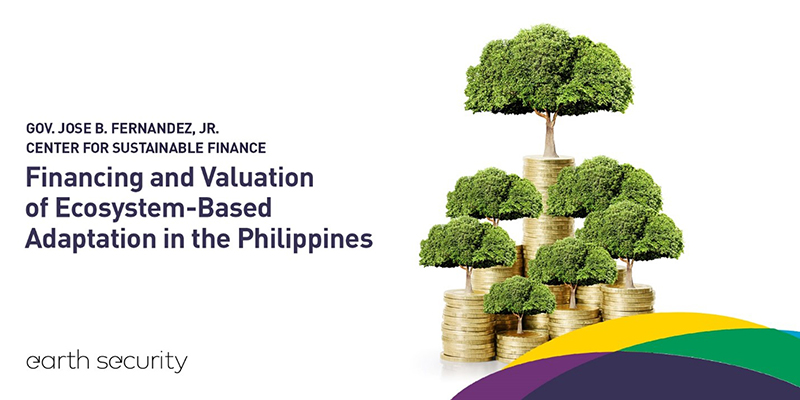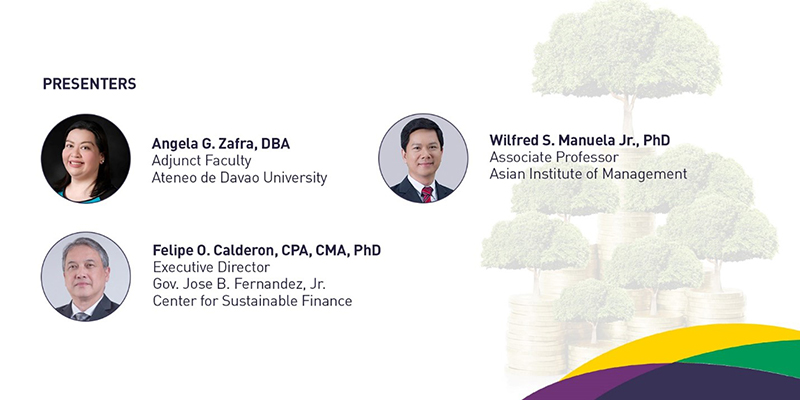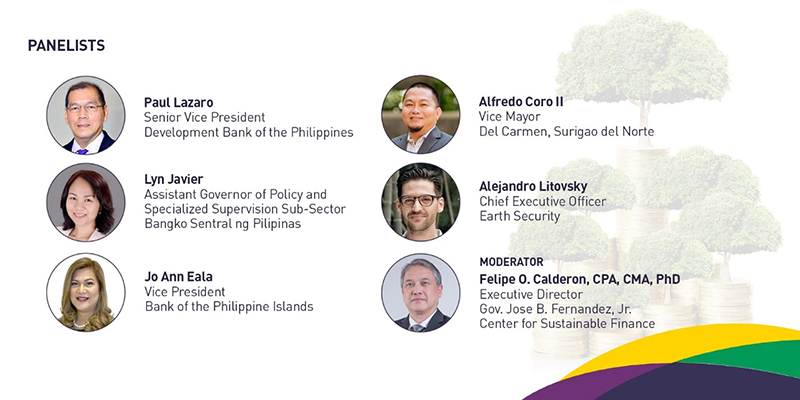
Representatives from development, commercial, and rural banks; Bankers Association of the Philippines; ADB; DENR; WWF; Association of Development Financing in Asia and the Pacific (ADFIAP); GIZ Regulatory Framework Promotion of Pro-Poor Insurance Markets in Asia; Philippine Insurers and Reinsurers Association (PIRA); and academic institutions attended the Gov. Jose B. Fernandez, Jr. Center for Sustainable Finance (JBF Center) webinar on Financing and Valuation of Ecosystem-based Adaptation in the Philippines last August 18, 2021.
The JBF Center, commissioned by Earth Security and funded by the International Climate Initiative of the German Federal Ministry for the Environment, Nature Conservation and Nuclear Safety, hosted the webinar to present the Center’s report on The Financial and Economic Case for Ecosystem-based Adaptation (EbA) in the Philippines. This report provides a thorough analysis of financing and valuating EbA projects to help the Philippine banking and finance industry appreciate the value of ecosystems and their role in mitigating the risks and negative impacts of climate change through EbA and other nature-based solutions, which may result in more resilient businesses and communities.
Ecosystem-based adaptation (EbA) is a nature-based solution for addressing the impacts of climate change on people and their environment. Making the economic and financial case for EbA to private sector stakeholders requires evidence that investments in these projects will lead to benefits for companies that are willing to get involved in such an undertaking. It is also imperative to demonstrate to financial institutions that developing financing mechanisms for EbA as part of their product portfolios is a good business decision and reflective of the current business environment.
The Bangko Sentral ng Pilipinas (BSP) issued BSP Circular No. 1085 in 2020, which requires banks to offer sustainable finance products to support economic growth and provide lasting benefits for both their clients and society while reducing pressures on the environment. The legislation acts as an opportunity to advocate for banks to make EbA projects eligible for sustainable financing.
The report finds that while there are already three Philippine banks that have published their respective sustainable finance frameworks, EbA projects are not explicitly stated in these banks’ current sustainable finance frameworks. Green bonds and green loans that adhere to different international standards are the typical sustainable finance products offered in the Philippines. Interviews with top executives of Philippine commercial and government banks reveal the different capacities, enabling factors, and barriers for banks to finance EbA projects. Key findings include limited knowledge of EbA and its value to businesses, and that banks are willing to finance an EbA project if it can be integrated into the company’s cash flow.

The report was presented by Maria Angela G. Zafra, DBA, Wilfred S. Manuela Jr., PhD, and Felipe O. Calderon, CPA, CMA, PhD during the event. Highlighted were the perspectives from the banking industry on financing ecosystem-based adaptation (EbA), the process of valuating natural ecosystems and application to the Trinity Project case -- a theoretical case study for sustainable finance that utilizes a three-fold EbA approach to rebuilding Hijo Resources Corporation’s coastal ecosystem. The case presents how the Trinity Project’s revenue model can be integrated into the company’s cash flow, which then can be used to apply for a sustainability-linked loan. The company can likewise explore a blended finance model with the local government to expand the project to cover public coastal areas.

The presentation was followed by a panel discussion with Paul D. Lazaro, Senior Vice President of Development Bank of the Philippines; Jo Ann B. Eala, Vice President of Bank of the Philippine Islands; Lyn Javier, Assistant Governor of Bangko Sentral ng Pilipinas; Alfredo Coro II, Vice Mayor of Del Carmen, Surigao del Norte; and Alejandro Litovsky, Chief Executive Officer of Earth Security. The panel discussion was moderated by JBF Center Executive Director, Felipe O. Calderon.
All participants of the webinar received an e-copy of a primer on Operationalizing Sustainable Finance for Ecosystem-Based Adaptation Projects and a handbook on Financing and Valuating Ecosystem-based Adaptation in the Philippines.
This primer is a concise version of A Technical Analysis of Financing Ecosystem-based Adaptation in the Philippines with a step-by-step guide for bankers to help operationalize the financing of ecosystem-based adaptation (EbA) projects. The handbook is a concise version of the unpublished report, The Financial and Economic Case for Ecosystem-based Adaptation in the Philippines. The first part of this handbook, Financing Ecosystem-based Adaptation in the Philippines, provides an overview of private financing options for ecosystem-based adaptation (EbA) projects; investigates current practices of financing EbA projects; and identifies potential factors that enable or hinder Philippine banks and financial institutions from offering financing for EbA projects. The second part of the handbook, Economic Valuation of Ecosystem-based Adaptation in the Philippines, examines the economic valuation of EbA projects and recommends policy options for the government and other stakeholders to help mitigate the impacts of climate change through EbA.
The JBF Center is committed to encouraging discussion and soliciting feedback on EbA in the Philippines. As a follow-up to the webinar, the Center will be convening small working groups to discuss how to implement and embed EbA in banking policies and programs. Discover the benefits of financing EbA activities and know how your bank, institution or LGU can be part of the EbA Working Group. Email us at jbfcenter@aim.edu.
Download Operationalizing Sustainable Finance for Ecosystem-Based Adaptation Projects Primer here.
Download Financing and Valuating Ecosystem-based Adaptation in the Philippines Handbook here.